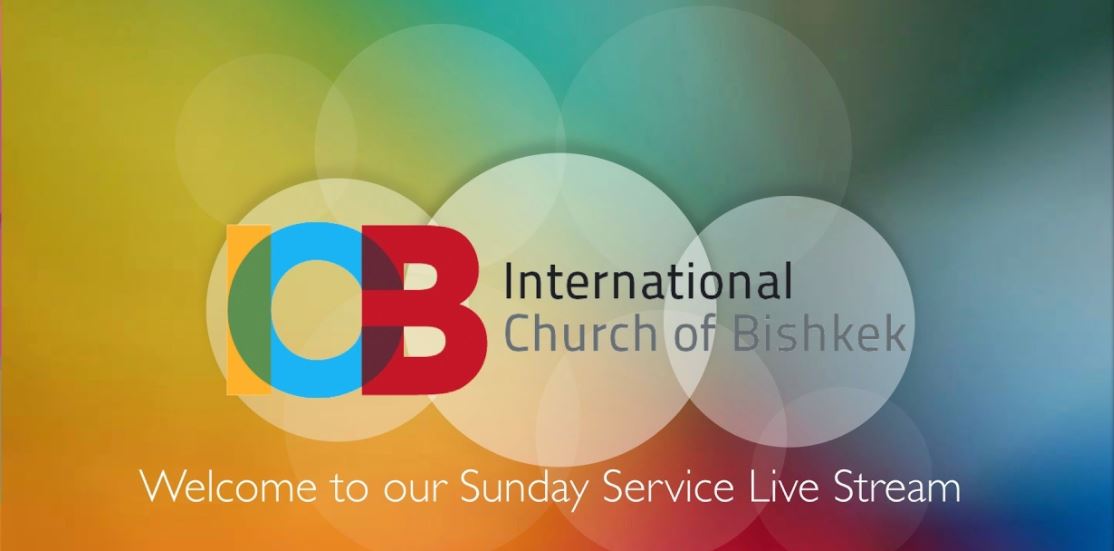|
photo by Laura Evans Now Hagar is Mount Sinai in Arabia; she corresponds to the present Jerusalem, for she is in slavery with her children. But the Jerusalem above is free, and she is our mother. Galatians 4:25-26 ESV Dear ICB family,
Two mothers. Two covenants. A mountain in Arabia. Two cities with the same name. And two sets of children. Paul moves through imagery quickly in Galatians 4:21–5:1, so it can be hard to keep up. Let's see if we can demystify what Paul is getting at. Hagar, a slave = God's covenant with his people that he made on Mount Sinai = present Jerusalem Hagar's children (that is, children of the Sinai covenant or children of present Jerusalem) are kept in slavery. They inherit nothing and are cast out. Sarah, a free woman = some other covenant that Paul doesn't explicitly mention = Jerusalem from above Sarah's children (that is, children of this unnamed other covenant or children of the Jerusalem from above) are free. They inherit everything from their father and are kept. What is Paul getting at? Hagar's children (a.k.a. children of present Jerusalem) are Jews still living under the old covenant that God made with his people on Mt. Sinai. Ironically, Paul refers to the ethnically Jewish teachers from Jerusalem who were causing all these problems in Galatia as children of Hagar! He calls the physical descendants of Isaac children of slavery! Sarah's children (a.k.a. children of the Jerusalem from above) are both Jews and Gentiles who are living as children of another covenant that Paul never defines, at least not explicitly—unless you know the context of Isaiah 54:1, the verse that Paul quotes in Gal. 4:27. Whenever you come across an Old Testament quote in the New, there's a good chance the author has the entire passage in mind when he quotes it. The quoted part should jog our memory to call up the rest of the passage. And what do we find when we go back to Isaiah 54? Well, the most careful observers will note that Isaiah 54 comes right after Isaiah 53, the last verse of which reads, "[A]nd he shall divide the spoil with the strong, because he poured out his soul to death and was numbered with the transgressors; yet he bore the sin of many, and makes intercession for the transgressors." Then Isaiah 54:1: "'Sing, O barren one, who did not bear; break forth into singing and cry aloud, you have not been in labor! For the children of the desolate one will be more than the children of her who is married,' says the Lord." Singing is the only appropriate response to the one who poured out his soul to death, who bears the sins of many, and who makes intercession for transgressors. In Isaiah 54 God goes on to say that even though his people have been disgraced for a while, they won't be put to shame forever. "For your Maker is your husband," he says (v. 5)! Yes, he was angry with his people for a while, "but with everlasting love I will have compassion on you" (v. 8). Then in verse 10 God promises his people, "For the mountains may depart and the hills be removed, but my steadfast love shall not depart from you, and my covenant of peace shall not be removed." On that day, God says, "All your children shall be taught by the LORD, and great shall be the peace of your children" (v. 13; cf. Jeremiah 31:33–34). Who can enter into this covenant of peace that Isaiah mentions in 54:10? He says, "Come, buy wine and milk without money and without price" (55:1), meaning it's a gift for those who come and receive it. "Incline your hear, and come to me; hear, that your soul may live; and I will make with you an everlasting covenant" (55:3). This is no reference to God's covenant with Israel on Mt. Sinai. This is a reference to God's promised new covenant that he will make with his people. Take in, then, the context of Isaiah 54:1: there's rejoicing on the heels of the death of one who bears the sins of many and makes intercession for transgressions (53:12), there's a covenant of peace with Israel's husband and Maker, who will have compassion on his people with everlasting love (54:10, 5, 8), and there's the offer to enter into this everlasting covenant by merely coming and receiving it freely with no payment whatsoever (55:1–3). With all that context ringing in our ears, Paul's quotation of Isaiah 54:1 at the end of Galatians 4 suddenly takes on new significance. If Hagar represented the covenant on Mt. Sinai, then, of course, Sarah represents the new covenant that God promised to make with his people at several points throughout the Old Testament, including here in Isaiah 53–55. This is a radically different kind of covenant. Sarah's true children, then, are comprised of both Jews and Gentiles who have entered into this new covenant that God has made with his people. It is hard to overestimate how explosive Paul is being here. He's saying that unless the children of "the present Jerusalem" (i.e., all those insisting on living under Mosaic covenant) turn and become children of "the Jerusalem from above" (i.e., those who have entered into God's new covenant made possible through Christ), they are going to be cast out right along with Ishmael and all his descendants. And many people without a single drop of Abraham's blood running through their veins will come and inherit everything right along with Isaac. And you want to run back to the old covenant? You want to forsake your entire inheritance by returning to the status of slave? Don't go there, Paul pleads with the Galatians and with us today. We're children of the free woman and heirs of God. Therefore, Paul says, "Do not submit again to a yoke of slavery" (Galatians 5:1). No longer a slave, Eric
0 Comments
Galatians 4:21-31; Genesis 16To celebrate ICB's 20th anniversary this year, Alastair Morrice, ICB's founding pastor, shared with us by video.
Jesus introduces you into the same relationship that he himself has with the Father, and access into such a relationship is a gift of God's free, unmerited grace. However, in the churches in the region of Galatia, new teachers were saying, "Oh, that's nice, but now there's something else." They added requirements to receiving acceptance before God. Pastor Morrice walks us through the consequences of such teaching as well as Paul's arguments against it. He concludes with the following practical applications:
Questions for personal reflection and/or group discussion:
photo by Laura Evans [H]ow can you turn back again to the weak and worthless elementary principles of the world, whose slaves you want to be once more? Galatians 4:9 ESV Dear ICB family, The Bible gives us penetrating insight into the human soul. Tucked away at the end of this verse is a short phrase that provides us with an example of such insight: "whose slaves you want to be once more." Surely Paul has made an overstatement here, right? No one wakes up one morning and says, "You know what I really want? I want to be a slave. If only I had a taskmaster over me to whom I could grovel!" In fact, in our day, authority, submission, or service to others amounts to secular blasphemy. We're free. We serve no one. We submit to one. We are our own authorities. Or so we say. The reality, however, is that the throne of the human heart cannot remain empty. If one master is removed, another will most certainly take its place. If one god is set aside, another will fill the void. And we will be the first ones to ensure the vacancy is filled. The throne of the human heart cannot remain empty. But why? What drives us to set up masters over ourselves when, in our day, nearly all we can talk about is our freedoms and our rights? Why is it that we actually want to be slaves? Deep down, we as human beings know something. It's probably not a conscious thought to most, but as surely as we all know what love is without ever being taught it and even without being able to properly define it, so, too, we all know that we by ourselves can never satisfy our deepest longings. We were not designed to be able to do so. We lack the internal machinery needed to produce the joy and satisfaction that our souls long for as much as our lungs long for oxygen. Our domestic economies are fully dependent upon imports. We must look outside ourselves. Though few would admit it, we all know it. At least we all instinctually perceive it, even if it's not a conscious thought. So we go in search of a master that we think can get us what we need. In other words, we want to be slaves. We all know that we by ourselves can never satisfy our deepest longings. The answer, then, is to be dependent on nothing, right? Surely the answer is to be set free from all masters. Some people do in fact sit down on the throne of their own hearts. Such people are perhaps the silliest of all. The very existence of the throne is indicative of the fact that we ourselves cannot ultimately satisfy the deepest longings of our hearts. We need an external source of hope and meaning and everything else, and that need is due to the fact that we are essentially dependent creatures who could never possibly meet our greatest needs ourselves. So what is a person to do? The biblical answer is not to cast off all masters. The biblical answer is to cast off all masters that can never satisfy and replace them with the one master who can. Israel was not freed from Egypt to remain from then on masterless. They were freed from Israel so that their good King Yahweh could take evil king Pharaoh's place. Cast off all masters that can never satisfy and replace them with the one master who can. So don't fight your urge to run back to slavery only by casting off other masters that enslave you. You must do that of course. But it is equally important to ensure that God takes up his place as your new master. Exactly as we have always wanted, this master is also infinite father and caring husband and faithful friend. He's powerful enough to be able to supply all our needs and loving enough to use that power for our good. He is the source outside ourselves that we were built to be connected to and therefore live. So come. Submit to his light yoke. Embrace the only one whose slave you actually want to be.* Grace and peace, Eric *Is it right to consider ourselves slaves of God? Didn't Jesus say, "No longer do I call you servants [literally slaves or bondservants], for the servant [slave] does not know what his master is doing; but I have called you friends" (John 15:15)? Yes, and this same Jesus told the parable that ends with "So you also, when you have done all that you were commanded, say, 'We are unworthy servants [slaves]; we have only done what was our duty" (Luke 17:10). Furthermore, Paul begins Romans by calling himself a slave of Christ Jesus, and he begins Titus by identifying himself as a slave of God. James and Jude begin their letters similarly, and so does Peter in his second letter. So yes, it is right to consider ourselves slaves of God. We are not only slaves, of course. We are also friends and children and heirs and brides. Even so, we do not dare give up the very precious title "slave of God."
Click on the image above to watch the service on our YouTube channel. Galatians 4:8-20; Numbers 14:1-4Paul is pleading with the Galatians not to turn back, and he gives them four reasons why:
For us today:
Questions for personal reflection and/or group discussion
photo by Laura Evans [W]e were held captive under the law, imprisoned until the coming faith would be revealed. Galatians 3:23 ESV Dear ICB family, On Sunday we gathered in close and heard the story of God's grand gospel retold through three precious biblical metaphors: the metaphor of the guilty being declared innocent in God's courtroom (that's justification), the metaphor of the slave being released from bondage and granted freedom (that's redemption), and the metaphor of the orphan being adopted into a new family (that's adoption). Each picture provides us as believers with deeper understanding into the great work of salvation that God has accomplished for us. A question arises here. What did God have in mind when he went to such lengths to secure our salvation? What was he driving at? What was his aim? His hope? His goal? Three passages give us a glimpse into God's purposes. First, consider Exodus 19:3–4. After Israel fled Egypt, crossed the Red Sea, and arrived at the foot of Mount Sinai, "[t]he Lord called to [Moses] out of the mountain, saying, 'Thus you shall say to the house of Jacob, and tell the people of Israel: You yourselves have seen what I did to the Egyptians, and how I bore you on eagles' wings and brought you to myself." Did you catch that? God hadn't merely afflicted the Egyptians. He hadn't only rescued Israel from bondage. His work was not just an act of miraculous deliverance as if on eagles' wings. It was all that. But it was more. You see, in delivering Israel, God was bringing his people to himself. Israel's greatest gain in casting off their old masters' shackles was not a reduced workload, the right to self-governance, or even freedom from institutionalized slavery—as great as such blessings are. Soaring high and above all those blessings was this: Israel got God. God took Israel out of Egypt so that he could reveal himself to them on Sinai and form with them a covenant through which they could commune with the living God. God sets his people free for relationship with him. In delivering Israel, God was bringing his people to himself. Skip ahead in time over 1400 years and dip down into the first century A.D. Years after Peter had walked with the Jewish Messiah, witnessed his death, wondered at his resurrection, and seen him rise back up into heaven, he penned these words: "Christ also suffered once for sins, the righteous for the unrighteous, that he might bring us to God" (1 Peter 3:18). Sounds a little familiar, doesn't it? Why did Christ suffer? Why did the righteous one die in place of the unrighteous? The answer could not be clearer: Jesus justifies the unjust that he might bring us to God. We rejoice in the great doctrine of justification; however, we don't stop rejoicing as soon as the judge reads the verdict "not guilty." Christ's provision of a way that guilty sinners could receive an innocent verdict was aiming at something. That was the only way the Judge could leap off his bench, race over to the formerly guilty defendant, and embrace him! God makes his people righteous for relationship with him. Jesus justifies the unjust that he might bring us to God. Back up in your Bibles to Ephesians 1:5–6, where we read, "[God] predestined us for adoption through Jesus Christ, according to the purpose of his will, to the praise of his glorious grace." Adoption involves a lot of time. There's endless red tape. The costs are huge. What was God after? Different from our two previous answers, here Paul says that God gave his people the destiny of being his adopted children "to the praise of his glorious grace." In other words, God adopted his people so that his mind-numbingly beautiful grace might be sung on the lips of his people for all eternity. God has adopted us so that he might receive the praise that is due him for his matchless gift of unmerited grace. God adopted his people so that his mind-numbingly beautiful grace might be sung on the lips of his people for all eternity. You might be tempted to ask, OK, so which is it? Did God save us to bring us to himself (Exodus 19:3–4; 1 Peter 3:18) or so that his adopted children would sing the praise of his amazing grace (Eph. 1:5–6)? Of course, just like we don't have to choose between understanding salvation as a declaration of not guilty, as freedom from slavery, or as adoption, neither do we have to choose between God's aims in securing his people's salvation. In fact, if you hold the diamond of salvation at just the right angle, you see that even these two ends are intertwined. One way of summing it up would be to say that in saving his people, God was aiming at reconciling a people to himself for his glory. When God makes a way for his people to come back to him, what else could they do but sing the praises of his grace? So as we experience the gifts of justification, freedom, and adoption, let us come to God and sing his praise. Coming and praising with you, Eric Click on the image above to watch the service on our YouTube channel. Galatians 3:23-4:7; Jeremiah 3:14-20Three words of hope: justified, redeemed, adopted
Justified: We are set right with God. The verdict "not guilty" has been handed down by the judge. Redeemed: We are set free from slavery. Redeemed means removed from the market and removed from being on sale. God has bought and freed his people. Adopted: We are set in the family. God takes us from the orphanage and into his home. He is the Father we all long for. Questions for personal reflection and/or group discussion
photo by Laura Evans It was not because you were more in number than any other people that the Lord set his love on you and chose you, for you were the fewest of all peoples, but it is because the Lord loves you and is keeping the oath that he swore to your fathers.... Deut. 7:7–8a ESV Dear ICB family, As we saw on Sunday from Deut. 7:7–11, Israel's only hope was that God would remain faithful to do exactly what he said he would do. "[I]t is because the LORD loves you and is keeping the oath that he swore to your fathers, that the LORD has brought you out with a mighty hand and redeemed you from the house of slavery, from the hand of Pharoah king of Egypt" (Deut. 7:8 ESV). And just in case Israel might have gotten the idea that they as a nation contributed at least a little to God's decision to deliver them, God says, "It was not because you were more in number than any other people that the LORD set his love on you and chose you, for you were the fewest of all peoples" (Deut. 7:7), and, "Do not say in your heart, after the LORD your God has thrust [the Canaanites] out [of the Promised Land] before you, 'It is because of my righteousness that the LORD has brought me in to possess this land,' whereas it is because of the wickedness of these nations that the LORD is driving them out before you…. and that he may confirm the word that the LORD swore to your fathers, to Abraham, to Isaac, and to Jacob" (Deut. 9:4–5). God loves you because he loves you. In other words, as Pastor Neil so pointedly stated, "God loves you because he loves you," which is another way of saying that God loves his people not because of their loveliness but because God is a loving God. Likewise, God said he going to be faithful to his people because he is a faithful God. He hadn't chosen Israel because of all the great traits he saw in them, and he wasn't going to remain faithful to his promises to them only to the extent that they remained faithful to his covenant commands. Nearing the end of Israel's 70-year captivity in Babylon, Daniel prays something that reveals that he had read his Pentateuch: "O my God, incline your ear and hear. Open your eyes and see our desolations, and the city that is called by your name. For we do not present our please before you because of our righteousness, but because of your great mercy. O Lord, hear; O Lord, forgive. O Lord, pay attention and act. Delay not, for your own sake, O my God, because your city and your people are called by your name" (Dan. 9:18–19). 'I will remember my covenant' (Lev. 26:42). God had promised his people numerous curses including exile for their trusting in idols and not keeping his commandments (Lev. 26:14–46; Deut. 4:25–31; Deut. 28:15–68). But he had also promised them that even then, "[I]f they confess their iniquity and the iniquity of their fathers in their treachery that they have committed against me… [and] if then their uncircumcised heart is humbled and they make amends for their iniquity, then I will remember my covenant with Isaac and my covenant with Abraham, and I will remember the land…. [W]hen they are in the land of their enemies, I will not spurn them, neither will I abhor them so as to destroy them utterly and break my covenant with them, for I am the LORD their God" (Lev. 26:40–45). Daniel got it exactly right when he based his entire prayer solely on God's mercy and faithfulness to his people who were called by his name. Now, what does all that have to do with us? Just like Israel, we as God's people under the New Covenant (the covenant that God has made with us and ratified by the blood of his Son) have a single hope, and that is the same single hope that Israel had: God will be faithful to us today and will fulfill his promises to us today for the sole reason that he is a faithful God. He didn't chose us because he saw our great potential. (If you've seen The Chosen, though I like the series in general, I happen to strongly disagree with the words put in Peter's wife's mouth to Jesus that Jesus must have seen all that Peter could have become and that that's why he chose Peter to follow him.) Likewise, God will not remain faithful to us based upon our faithfulness to him. We as God's people under the New Covenant… have a single hope, and that is the same single hope that Israel had: God will be faithful to us today and will his promises to us today for the sole reason that he is a faithful God. He does not hear our prayers for forgiveness and restoration when we find ourselves under his loving discipline because of our righteousness or because of how sorry we feel or because of how much penance we've done to set things right. Yes, God is "near to the brokenhearted and saves the crushed in spirit" (Psalm 34:18), meaning there is no way around true repentance. However, what I'm arguing here is that our ultimate, bedrock hope that God will hear our repentant cry is that he is faithful to his promises. That's how we can know without even the slightest hint of a fraction of a doubt that when we confess our sins, he is faithful and just to forgive us our sins and to cleanse us from all unrighteousness (1 John 1:9). He will do that because that is a clause in the New Covenant. We can rest assured that Jesus will welcome us the very minute we have committed the most grievous sin we can think of because Jesus said, "All that the Father gives me will come to me, and whoever comes to me I will never cast out" (John 6:37). And Jesus will do that because that, too, is a clause in the New Covenant. And God keeps his covenants. When we as individuals, as a community, as a local church, as a nation, or as the worldwide body of Christ come to God, our only hope in that moment is that God will be faithful to honor the promises that he has ratified to his people in the New Covenant. Do you pray that way? Not, "Bless us because of our shining righteous example." Instead, "Bless us because you are a good Father who knows how to give good gifts to your children, and you've promised to do so." Not, "Forgive me because this time I promise I will never do it again." Instead, "Forgive me because you have promised to forgive and cleanse your people when they confess their sins." Not, "Fill me with your Holy Spirit because I'm pretty good and could become great if I had a boost of divine power." Instead, "Fill me with your Holy Spirit because you promised that under the terms of your New Covenant with your people you would do exactly that." Not, "Hear our cries for deliverance because we're so lowly and pitiful and could really use your helping hand right about now." Instead, "Hear our cries because you have commanded us to cast all our cares upon you because you care for us." This is what it means to live by faith. At every moment we anchor our soul in what God has promised us, and we cling to that as the only basis of our hope in this life and the next. Standing on the promises with you, Eric Click on the image above to watch the service ICB's YouTube channel. Deuteronomy 7:7-11; Galatians 3:15-29The focus of Galatians 3:15-29 is verse 26: "In Christ Jesus you are all children of God through faith." That is, all people regardless ethnicity, social status, gender, or any other consideration are only accepted before God "in Christ Jesus."
However, to understand this passage correctly, we need to understand the covenant given to Abraham and the Law given to Moses. 1. Covenant to Abraham God's covenant to Abraham is God's declaration of "I am yours, and you are mine." God is the initiator. When Abraham believed God, God saw his faith and credited that faith to him as righteousness (Genesis 15:6). Paul argues here that before the circumcision and the Law, God had already declared his promises and made his covenant with Abraham. 2. The Law The Law came 430 years later. Paul's point is that God's promise came before the Law; therefore, the Law does not annul the promise. The biblical pattern is that grace always comes before Law, covenant comes before commandment, and salvation before legislation. Questions for personal reflection and/or group discussion
|
Archives
May 2024
Categories
All
|






 RSS Feed
RSS Feed